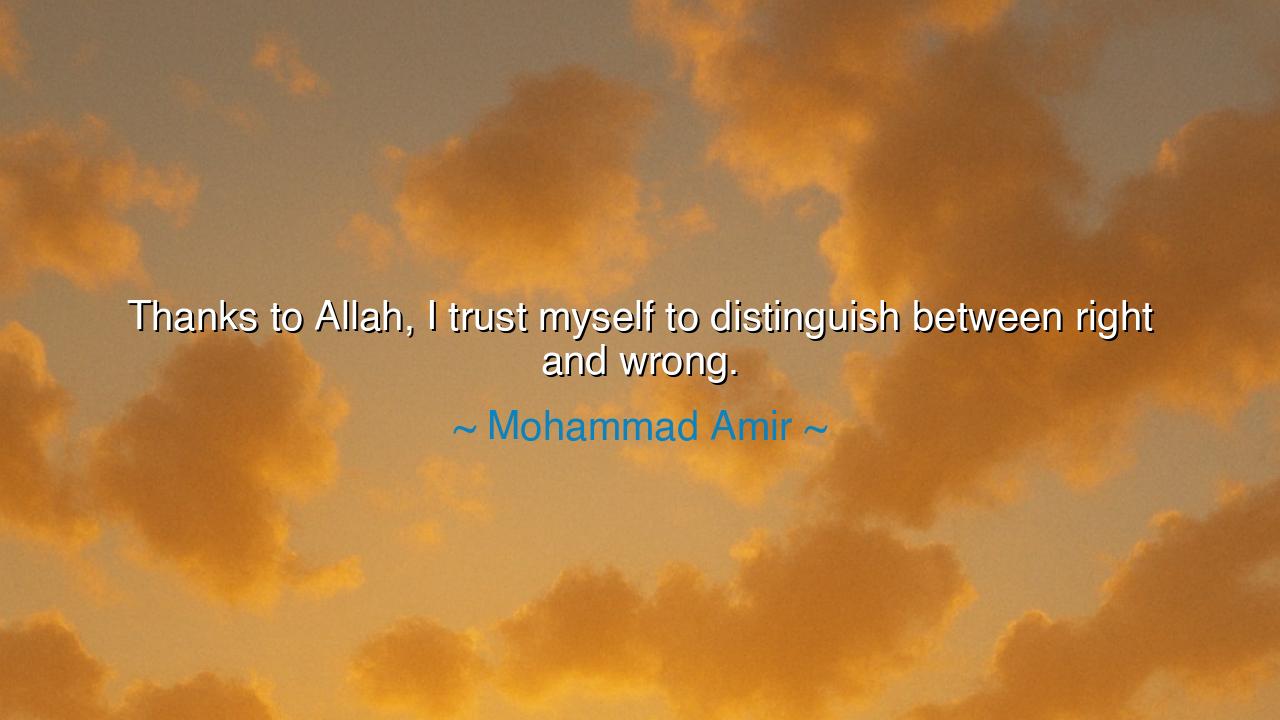
Thanks to Allah, I trust myself to distinguish between right and






Hear, O seeker of truth, the humble yet powerful words of Mohammad Amir: “Thanks to Allah, I trust myself to distinguish between right and wrong.” These words, though simple, carry the weight of ages, for they bind together the human heart’s yearning for moral clarity with the eternal guidance of the Divine. They speak to the truth that man, left to his own devices, may stumble and err, but with faith in the Almighty, he may walk a straighter path, discerning justice from injustice, truth from falsehood, light from shadow.
The origin of this wisdom rests in the long tradition of faith guiding conscience. Across centuries, believers have proclaimed that their ability to judge rightly is not born of pride, nor of mere intellect, but of divine mercy. In Islam, as in many faiths, it is believed that Allah grants every human a conscience, a light within the soul called fitrah, the natural inclination to good. Mohammad Amir’s words reflect this ancient teaching: he does not claim perfection, but gives thanks that through Allah, he can place trust in his own discernment of right and wrong.
The ancients bore witness to this truth. Socrates declared that the unexamined life is not worth living, for wisdom requires the pursuit of what is good and the rejection of evil. The prophets of old, from Moses to Muhammad, guided their people not only with laws but with reminders that the heart, touched by God, can recognize justice. Thus Amir stands in a long line of men who remind us that true moral strength is neither blind obedience nor reckless autonomy, but faith married to conscience.
Consider the story of Omar ibn al-Khattab, the second caliph of Islam. Before his conversion, he was feared as a harsh man, quick to violence. Yet when the light of Allah entered his heart, his conscience was transformed. He became a ruler famed for his justice, able to distinguish between right and wrong with wisdom and courage. In his presence, widows and orphans found protection, and the oppressed found relief. His life illustrates the very truth Amir’s words proclaim: faith empowers the conscience to act justly.
Yet this teaching also bears a warning. For there are those who claim to know right and wrong but are led astray by arrogance, greed, or hatred. To trust oneself without humility before Allah, or without reflection, is to risk error. Amir’s wisdom lies in his gratitude: he acknowledges that his ability to discern is not his own achievement but a blessing bestowed by the Almighty. In this humility, he finds strength; without it, he would find only pride.
The lesson, O listener, is clear: seek to cultivate trust in your own conscience, but anchor it in faith, humility, and gratitude. Do not be paralyzed by doubt, nor reckless in confidence. Walk the middle path—pray for guidance, reflect deeply, and then act with conviction. For to hesitate forever is to waste one’s life, but to act without conscience is to destroy it. Trust yourself, yes, but only as one who knows that their wisdom is sustained by the Giver of wisdom.
Practical wisdom flows from this. Begin each day with gratitude, as Amir does, acknowledging the source of your discernment. When faced with choices, pause to ask: is this action rooted in justice, kindness, and truth? If your heart finds peace and your faith affirms it, then walk boldly forward. If unease lingers, seek counsel, reflect, and refrain. Over time, your ability to distinguish will grow stronger, and your life will become a testimony to the power of faith-guided conscience.
So remember the words of Mohammad Amir: “Thanks to Allah, I trust myself to distinguish between right and wrong.” Let them be both prayer and guide to you. For in gratitude lies humility, in humility lies wisdom, and in wisdom lies the power to walk the path of righteousness without fear. Thus may you live not only with clarity of mind, but with the peace of heart that comes from knowing your steps are guided by the Light of the Most High.






AAdministratorAdministrator
Welcome, honored guests. Please leave a comment, we will respond soon